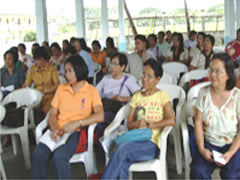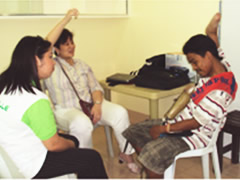- Home
- Technical Cooperation Projects
- Index of Countries
- Asia
- Philippines
- Creation of Non-Handicapping Environment for Persons with Disabilities in the Rural Areas
- Project Activities
- Impairment/Disability Classification Training
Impairment/Disability Classification Training
The Impairment/Disability Classification Training was successfully held from June 29 to July 2, 2009 in New Lucena with a total number of eighty five (85) participants and twenty (20) core participants; and from August 4, 2009 to August 7, 2009 in Opol, Misamis Oriental with a total number of seventy six (76) participants and twenty (20) core participants.
The training program was designed for the purpose of PWDs registration. This gives responsible personnel of the NHE Pioneering Municipalities the confidence and competence to implement the PWDs Registration using the Department of Health (DOH) Philippine Registry Form for Persons with Disabilities developed by the National Center for Disease Prevention and Control of Degenerative Diseases Offices in 2005.
 New Lucena participants during the orientation on children with disabilities
New Lucena participants during the orientation on children with disabilities
The DOH PWDs Registration Form classifies the disabilities into nine (9) categories:
- Psycho-social
- Mental
- Hearing
- Visual
- Learning
- Orthopedic
- Chronic Illness
- Speech
- Multiple
Consequently, the supplemental on functional assessment has been developed and modified to address possible problems and an on-site training program is developed to train community workers to use the DOH Registration form and modified supplement.
 Opol PWD during the classifying disability session.
Opol PWD during the classifying disability session.
Training Objectives
- Lead a team of community health workers in
- a. Completely filling out the DOH Philippine Registry Form for persons with disabilities with 90% accuracy rate.
- b. Conducting a functional assessment of the registered PWDs with at least an 80% accuracy rate using the NCDA-JICA DOH based Functional Assessment form.
- Give strategies/solutions to problems encountered during the actual survey such as but not limited to the following:
- a. Incomplete data collection
- b. Inaccurate data collection and/or processing
- c. Labeling and /or categorizing "difficult to classify" cases
- d. Temporal issues (transient disabilities or illness)
- Effect of age (recognizing disabilities in babies and young children; normal changes of aging; changes in functional expectations through the lifespan)
- The changing definition of disability
- Record keeping and updating of the registry
- About JICA
- News & Features
- Countries & Regions
- Our Work
- Thematic Issues
- Types of Assistance
- Partnerships with Other Development Partners
- Climate Change / Environmental and Social Considerations
- Evaluations
- Compliance and Anti-corruption
- Science and Technology Cooperation on Global Issues
- Research
- JICA Development Studies Program / JICA Chair
- Support for the Acceptance of Foreign HRs / Multicultural and Inclusive Community
- Publications
- Investor Relations
